| Article ID | Journal | Published Year | Pages | File Type |
|---|---|---|---|---|
| 5036073 | Personality and Individual Differences | 2017 | 4 Pages |
â¢We investigated the social nature of curiosity.â¢We focused on rejection sensitivity (RS) and social rejection experiences.â¢RS mediated the relationships between curiosity and psychological adaptations.â¢Curiosity modulated the relationship between social rejection and life satisfaction.â¢The present study serves to highlight the social strengths enjoyed by the curious.
Recent studies have revealed that curiosity-seeking new information and experiences-can improve psychological and social functioning. However, the social nature of curiosity remains poorly understood. We tested whether curious people show better psychological adaptation because (1) they have less rejection sensitivity, and (2) they are less susceptible to daily social rejection experiences. These two hypotheses were supported by a cross-sectional study (NÂ =Â 500, 20-39Â years old). We found that rejection sensitivity partially mediates the relationship between curiosity and psychological adaptation (life satisfaction and depression). Furthermore, curiosity moderated the relationships between perceived daily social rejection experiences and life satisfaction: Curious people are buffered against such aversive effects, relative to less curious people. Our findings suggest one possible explanation for why curious people experience better psychological functioning: They appear to be less affected by social rejection.
